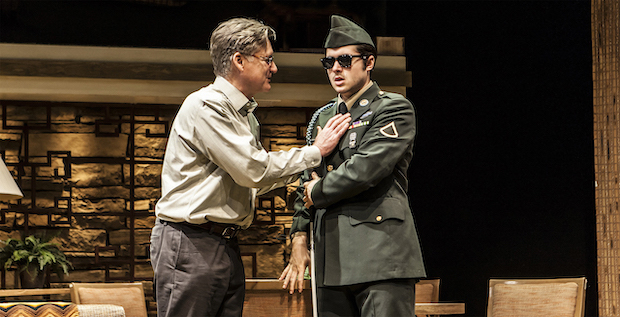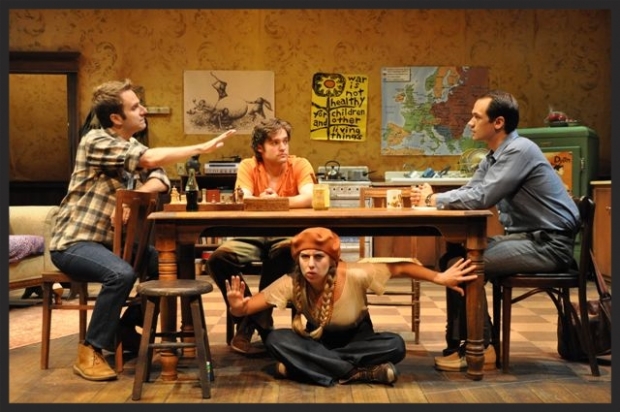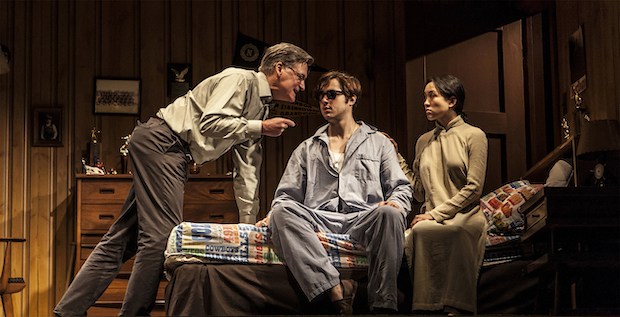Two Playwrights Talk About Their Controversial Vietnam-Era Works 50 Years Later
Michael Weller and David Rabe Look Back at ”Moonchildren” and ”Sticks and Bones”.

(© Monique Carboni)
The year 1972, when Richard Nixon was reelected president by a landslide, is perhaps not often remembered as a particularly innovative or progressive time for Broadway, but the 1971-72 season included the original runs of the musicals Follies, Jesus Christ Superstar, and Ain't Supposed to Die a Natural Death, and the plays Lenny, No Place to Be Somebody, and The Trial of the Catonsville Nine. Not all were hits, but change was in the air.
Two plays from this period have come to be viewed as landmarks among works responding to the Vietnam War, then still raging: Michael Weller's Moonchildren and David Rabe's Sticks and Bones. Both had played elsewhere to acclaim: Weller's at the Royal Court in London (under its original title, Cancer) and at Arena Stage in Washington, DC; Rabe's off-Broadway at the Public Theater. Neither depicted the war itself, but rather the situation at home. Weller's story ranged across a group of college friends, living then-unconventionally together off campus, including one who receives his draft notice. Rabe looked at an idealized family (patterned on the Nelsons from TV's Ozzie and Harriet) shattered by the return of their eldest son, who is blinded in combat.
Both works were well-received in New York. Sticks and Bones won a Tony Award for Best Play and Weller received a Drama Desk for Most Promising Playwright. It played 246 performances and was later made into a controversial television film. Moonchildren's Broadway run was considerably briefer (28 performances), but the play would find popular success a year later in a separate off-Broadway production. Moonchildren's last major New York production was in 1987 at Second Stage; Sticks and Bones was revived by the New Group in 2014.
Though the two plays overlapped in Times Square for only a few weeks, 50 years on they are forever linked as among the foremost plays showing a nation grappling with change and conflict. Recently, the playwrights looked back at their Broadway debuts.

(© Tricia Baron/David Gordon)
This conversation has been condensed and edited for clarity.
What was it like to put your play on Broadway in 1972?
Michael Weller: I never went to a Broadway show. Maybe West Side Story was the only play I ever saw. I always thought that Broadway was full of people talking silly, using funny voices that no one ever used to talk. I never considered Broadway serious in the sense of something that reflected a world I understood or knew or had been in.
David Rabe: Honestly, I didn't think the play belonged on Broadway. Even at the Public, audiences were conflicted about how to respond. But Joe [Papp] was determined, so we went and it worked out.
Michael: I thought what we were doing was like a whole new way of bringing an image of the world to attention that was not represented very much in other areas. That was very egotistical and naive of me, but that's the way it felt at the time.
David: Sticks and Bones isn't the only play that I've written only to be shocked by the reaction it provoked. Parts of the audience, even if they might be opposed to the war, felt accused. I can't remember if it was Liz [Wilson] or Tom [Aldredge] who said they felt that some nights they deserved combat pay to go out there and perform, on Broadway in particular.

(© Jaime Davidson)
Do you remember seeing each other's play back in the day?
David: I had a great time with [Moonchildren]. I was very taken with it, its kind of whimsy and charm, and also the reality of it. I thought it was very compelling.
Michael: I thought [Sticks and Bones] was really daring and viscerally got under my skin. That was my main memory. I thought, This is a play that is someone's nightmare being really powerfully realized.
How do you think your play resonates today?
Michael: Right from the start, the play really got under people's skin, and productions were closed down. Casting was changed slightly. Words were changed. Obscenity was taken out. I think it was always perceived as troublesome to play in terms of mounting it anywhere. Then it went into a phase where it was the play you did as a study guide to the '70s.
David: I think the issues at the heart of the play are very much on the surface again. They weren't in 2014. It's possible to look at a play and praise it, but also kind of see it as in its era. The reviewers tended to say it was Vietnam. Today I would hope they would make the play be seen as more relevant to what's happening now.

(© Monique Carboni)
Michael: Maybe it's like The Time of Your Life or one of those big plays that brings people together. But I really don't know, I don't know how people see plays. I don't know how they look back on them. I find that very mysterious now, because I think theater audiences are so balkanized. The idea of a mainstream major play with a statement that is taken to be a generational landmark just hasn't occurred in a very, very long time, maybe since Angels in America.
David: Racism and political internal violence within the country – that's what the play is about. Finally, his parents say to that young man, "Shut up," basically talk him into killing himself, because he's indicting them for the way they live. The father at one point says, "If I have to lie to live, I will, I'll lie." How does that sound now?










